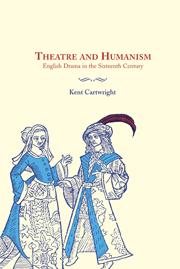Book contents
- Frontmatter
- Contents
- Acknowledgments
- Introduction
- 1 The humanism of acting: John Heywood's The Foure PP
- 2 Wit and Science and the dramaturgy of learning
- 3 Playing against type: Gammer Gurton's Needle
- 4 Time, tyranny, and suspense in political drama of the 1560s
- 5 Humanism and the dramatizing of women
- 6 The confusions of Gallathea: John Lyly as popular dramatist
- 7 Bearing witness to Tamburlaine, Part 1
- 8 Robert Green's Friar Bacon and Friar Bungay: the commonwealth of the present moment
- Afterword
- Notes
- Index
4 - Time, tyranny, and suspense in political drama of the 1560s
Published online by Cambridge University Press: 22 September 2009
- Frontmatter
- Contents
- Acknowledgments
- Introduction
- 1 The humanism of acting: John Heywood's The Foure PP
- 2 Wit and Science and the dramaturgy of learning
- 3 Playing against type: Gammer Gurton's Needle
- 4 Time, tyranny, and suspense in political drama of the 1560s
- 5 Humanism and the dramatizing of women
- 6 The confusions of Gallathea: John Lyly as popular dramatist
- 7 Bearing witness to Tamburlaine, Part 1
- 8 Robert Green's Friar Bacon and Friar Bungay: the commonwealth of the present moment
- Afterword
- Notes
- Index
Summary
The early 1560s mark a watershed in Tudor drama, when both popular and humanist theatre exploit an affective, psychological dramaturgy. In 1531, Sir Thomas Elyot, in The Boke named the Gouernour, argued that literary images of virtue can so inflame the heart as to stir readers to moral emulation. By the 1580s, however, antitheatricalists such as Stephen Gosson could charge that drama's excitement of spectators' passions outstrips its influence upon their ethics. That new distrust of drama's emotive power may have been well founded, for English playwrights in the 1560s elaborated audience-arousing strategies: variety; fantasy; wish fulfillment; spectacle; and, not least, time-related devices such as anticipation, retrospection, and expansion or compression of action – leading to a new quality of suspense. Emotional and psychological effects become increasingly important to theatrical meaning, a change that includes both popular and humanist drama and suggests that these presumably separate traditions may share affective common ground.
The 1560s, of course, mark a watershed in Tudor history: Elizabeth's ascension; the reinstitution of Protestantism; the end of religious burnings; the Marian exiles' return; the expansion of humanism; and the emergence of political, religious, and intellectual leaders of a new generation. These realignments encouraged political reconsiderations on the stage. Thus one common theme of early Elizabethan plays – including Cambises (c. 1561), Gorboduc (1562), Appius and Virginia (c. 1564), Damon and Pithias (1564), Jocasta (1566), Gismond of Salerne (c. 1566), and Horestes (S.R. 1567) – is tyranny.
- Type
- Chapter
- Information
- Theatre and HumanismEnglish Drama in the Sixteenth Century, pp. 100 - 134Publisher: Cambridge University PressPrint publication year: 1999



